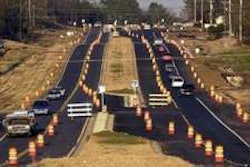 I-95 near Richmond, Va. (Courtesy of Virginia Department of Transportation)
I-95 near Richmond, Va. (Courtesy of Virginia Department of Transportation)Virginia Gov. Bob McDonnell Sept. 19 said the Federal Highway Administration has granted the state preliminary approval to toll I-95 under a pilot program if it meets certain conditions.
The state estimates it could generate $250 million over the first five years of the toll program and over $50 million annually afterward.
The American Trucking Associations quickly opposed the preliminary approval. “While it is true that I-95 is one of the ‘most important and heavily traveled highway corridors in the country,’ as Gov. McDonnell says, there are far more expeditious and efficient ways of raising revenue for its upkeep than tolls,” said Bill Graves, ATA president and chief executive officer. “Study after study shows that tolls carry astronomically higher capital and overhead expenditures compared to the fuel tax.”
Graves said raising the fuel tax provides revenue immediately rather than over several years like tolling. “And it doesn’t require upfront investment to build a government bureaucracy to collect it,” Graves said. “While many see tolling as a way to avoid raising taxes, tolls certainly are taxes, and imposing them is certainly not a conservative way to finance highways.”
In addition to the financing inequity, Graves said imposing tolls only would drive trucks off onto smaller secondary roads that aren’t designed to handle the increased traffic. “The Interstate Highway System was designed to promote the free flow of goods across our country,” he said. “Setting up toll booths at our borders and near our cities will restrict those goods and harm our economy.”

The state would use toll revenues to finance capacity expansion and operational and safety improvements. Examples of potential projects include widening I-95 between I-295 and the North Carolina border, enhancing Intelligent Transportation Systems and installing over-height detectors on bridges, the Virginia Department of Transportation said.
Virginia will be one of only three states in the Interstate Reconstruction and Rehabilitation Pilot Program with authority to toll Interstate facilities after it completes studies and meets other statutory requirements, the state said.
As part of this approval, the state dropped preliminary plans to toll I-81, a statement said.









